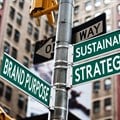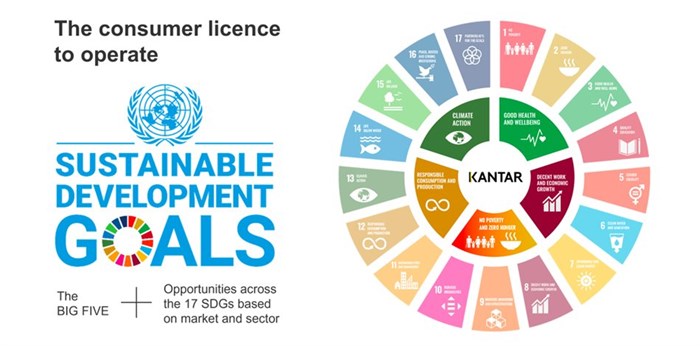SustainAFRICAbility: 5 action points from brands this Africa Day

Far from waiting for others to solve sustainability issues, brands in Africa are responding by developing uniquely African solutions to challenges faced by people on the continent. Life-saving medications are being delivered by drones in Rwanda. Solar solutions are helping to tackle South Africa’s energy crisis. Houses are built from agricultural waste and low impact materials like fungi in Kenya. Mobile banking services are addressing the need for financial inclusion, allowing people who live in the most remote areas to make payments, purchases and send and receive money.
At COP27 in Egypt last year, 50+ of Africa’s biggest businesses including Safaricom, Clicks Group, East African Breweries Limited, Jumia, First Bank of Nigeria and Sanlam, came together to form the African Business Leaders Coalition, a CEO-led alliance committed to advancing sustainable growth, prosperity and development across Africa in a diverse range of sectors.
African innovators have also been recognised by the Earthshot Prize, which Kantar proudly collaborates with as their insights partner. Launched globally by Prince William in 2020, the prize is designed to find and grow solutions to repair our planet in the next decade. Amongst the 2022 winners was Mukuru Clean Stoves, a Kenyan start-up providing cleaner-burning stoves to women in Kenya.
While Africa bears the brunt of climate challenges, the continent is not the biggest contributor to the crisis. An Oxfam study found that an individual living in the UK emits more CO2 in just two weeks than an individual living in Uganda does in an entire year. Nonetheless, African nations are committed to being part of the solution. More than 40 African countries have revised their national climate plans to make them more ambitious and add greater commitments to climate challenges and solutions.
Africa is however disproportionately affected by the impact of the climate crisis. Extreme weather events such as the devastating floods in South Africa’s KwaZulu-Natal in 2022 – the most catastrophic natural disaster ever recorded in the province – exacted a huge human and economic toll. Climate change has been linked to the drought in East Africa, the worst in the last 40 years, as well as the locust infestation in 2022 which caused havoc with crops in the region, threatening food security and the livelihoods of affected populations.
Kantar’s Sustainability Sector Index study reveals that solving the climate crisis is one of the top three concerns of people living in Africa. Other top of mind concerns include poverty, lack of access to healthcare, lack of clean and safe water, poor sanitation, and the state of the economy. The study also shows that consumers are scrutinising how brands, corporations and governments are responding to these challenges. Not only are they holding brands accountable but they expect impactful action. Kantar’s Global Issues Barometer reveals that most respondents believe that it is everybody’s collective responsibility to tackle climate issues – with a reduction in carbon emissions, as well as consumption and waste top of mind – and this includes brands.
Brands therefore need to think carefully about the role they play in society, connecting with the local context and the biggest sustainability concerns of their target market. They need a clear idea of which specific social or environmental sustainability issues consumers expect their sector to address so that investment is placed on actions that matter and to ensure that the brand is seen as authentic and credible.
Examples of African brands that are successfully navigating the sustainability space include Savanna which recently launched the Savanna Dry Goods campaign. The brand has partnered with South African designer Wanda Lephoto to launch a limited-edition fashion collection of ‘Dry Goods’, waterproof apparel 'for a world underwater'. Savanna's signature dry commentary on the impact of fast fashion on climate change is a refreshing take on the topic. The wet-future-visuals are a sobering premonition of a world to come. All the profits from the sale of the Dry Goods range will be donated to climate action organisation, GreenUp.
Another example is solar company Hohm Energy that has created a humorous campaign aimed at encouraging consumers to implement solar installations in South Africa, in response to the ongoing power crisis. Both brands have successfully managed to tap into different burning platforms upon which to structure their sustainability activation, with specific sustainability concerns associated more strongly within their sectors.
Key to a successful sustainability strategy is to find a connection between what matters to consumers and what the brand is perceived to have a right to do. A brand’s sustainability strategy needs to talk to local realities and deliver value and benefit to consumers. The 17 SDGs defined by the United Nations provide a good framework for businesses and brands to structure their sustainability initiatives.
When brands get it right, as both Savanna and Hohm Energy have with their recent campaigns, they have an opportunity to connect meaningfully with consumers and, given that sustainability is closely linked to brand value growth, it also makes commercial sense. The evidence is clear: sustainable business is good business, allowing companies to sell more, spend less, grow their brand value and attract top performing talent, amongst others.
However, getting it wrong comes with significant risks, including being accused of inauthenticity and greenwashing.
To advance their sustainability agenda in Africa and connect with consumer concerns, values and expectations, businesses and brands need to focus on five action points that are specific to the region, rather than adopting agendas from other parts of the world. We call this the consumer licence to operate.
- Brands and businesses must ensure they adopt responsible production practices by reducing pollution, preserving energy and creating products that make it easier for consumers to live a more sustainable life.
- Offer decent work opportunities and help to promote economic growth.
- Play a role in eradicating poverty and hunger.
- As employers, businesses need to facilitate healthcare and particularly mental health.
- Focus on climate action in terms of reducing greenhouse gas emissions, reduce waste and innovate to create circular and regenerative value chains.
These five action points need to be incorporated into the spine of business’ overall strategies and operations and then filtered into finding the right opportunities to pursue at a brand level.
Over and above the food crisis exacerbated by the climate emergency, rampant inflation and the rising cost of living means that sustainability is more important than ever. In fact, the cost-of-living crisis reiterates the need for affordable products that are good for society. Sustainable products have to be for everyone. At the same time, consumers are looking to businesses and brands to support the economy by sourcing local ingredients and moving to local production. Circularity has become an expectation. Consumers are already doing a lot to reduce their consumption and waste and they expect brands to help them.
While consumers don’t expect their cider brand to solve the climate crisis or a solar brand to resolve the energy crisis, what they do increasingly expect is tangible evidence that businesses and brands are making efforts to improve the quality of life for people and communities. Actions will always speak louder than empty platitudes.
With so much energy and innovative spirit in Africa, African brands have a huge opportunity to be part of a positive movement for society, the environment and the economy – and harness sustainable commercial and brand value growth.
To find out what consumers in Africa care about, what they expect from your sector, and what daily struggles they want brands to help them solve, find out more about Kantar’s Sustainability Sector Index 2023 – and build a solid foundation to put ambition into action and unlock sustainable growth. Contact Astrid Ricketts, sustainable transformation practice lead, Middle East & Africa at moc.ratnak@sttekcir.dirtsa for more information.
Join the conversation, follow us on LinkedIn and Twitter for our latest insights to help you understand people and inspire growth.
About Astrid Ricketts
Astrid Ricketts is sustainable transformation practice lead, Middle East & Africa, Kantar.- Consumers face climate burnout as fears over global conflicts increase17 Feb 10:35
- Kantar announces senior appointments in South Africa and Africa20 Jan 08:53
- 10 marketing trends for 202618 Nov 08:51
- Rethinking AI-Generated advertising: How real people really react12 Nov 12:31
- The non-human consumer: How AI is transforming everyday buying decisions05 Nov 12:41




































